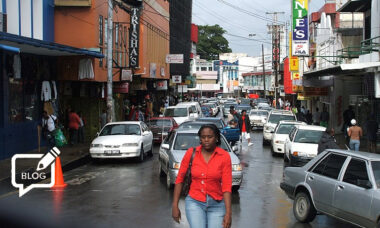 Lying, at its closest, just seven miles off the coast of Venezuela, Trinidad and Tobago is in many ways a world apart from that troubled country. The West Indian island nation’s 1.3m people are the third richest per head in the Americas, after only the US and Canada. You might infer a lot just from the title of its national anthem, “Forged from the Love of Liberty”.
Lying, at its closest, just seven miles off the coast of Venezuela, Trinidad and Tobago is in many ways a world apart from that troubled country. The West Indian island nation’s 1.3m people are the third richest per head in the Americas, after only the US and Canada. You might infer a lot just from the title of its national anthem, “Forged from the Love of Liberty”.
But if “liberty” means “freedom”, there are different ways to interpret what that means. Freedom from regulation isn’t necessarily a desirable thing.
In the US and Canada, for example, the e-cigarette industry may suffer and threaten action against what it sees as over-regulation (is a proposed limit on flavours really an “existential threat” to the Canadian vape business?) but in Trinidad it’s the lack of regulation that troubles e-cig traders.
According to a report in the country’s Newsday paper, “There is consensus among vaping retailers across the country on the need for regulations, including putting age limits on buying and using of products; industry reporting; manufacturing standards; product and package labelling, such as health warnings; banning the use of certain ingredients and flavours; and promoting products”.
While at first sight, to the uninvolved, it might seem strange for any business to call for limits on its activities, there is a lot of sense in this. And indeed it’s a call that will sound familiar to e-cig traders in many other parts of the world – such as Brazil, for example – where the alternative to regulation is an outright ban.
Safety in controls
And in many ways – ways that are detrimental to both public health and responsible, legitimate business – prohibition and total lack of regulation have similar consequences. A black market in one case and an unrestricted market in the other can both mean poor quality, potentially unsafe products.
As Daren Narine, owner of Premium Vapes in Trinidad’s largest city, San Fernando, told Newsday: “All imports should meet a standard of quality control in order for the products to be sold here. This call for regulation is not because vaping liquids are specifically harmful, but because all industries have regulations, and this one should be no different, to ensure consumer safety.”
And, he might have added, business safety too. Nothing risks loss of consumer confidence, and possible over-restrictive official reaction, more than the circulation of substandard, potentially dangerous, products.
So should regulations be imported along with the e-cigs and e-liquids? Here, too, Narine sounds a wise note: “We can use other countries’ understanding and research as a base, like the US or the UK, but ultimately our legislation should be reflective of our own society so we will not have to revise or amend it three years down the line.”
– Aidan Semmens ECigIntelligence staff
Photo: Wikimedia Commons






